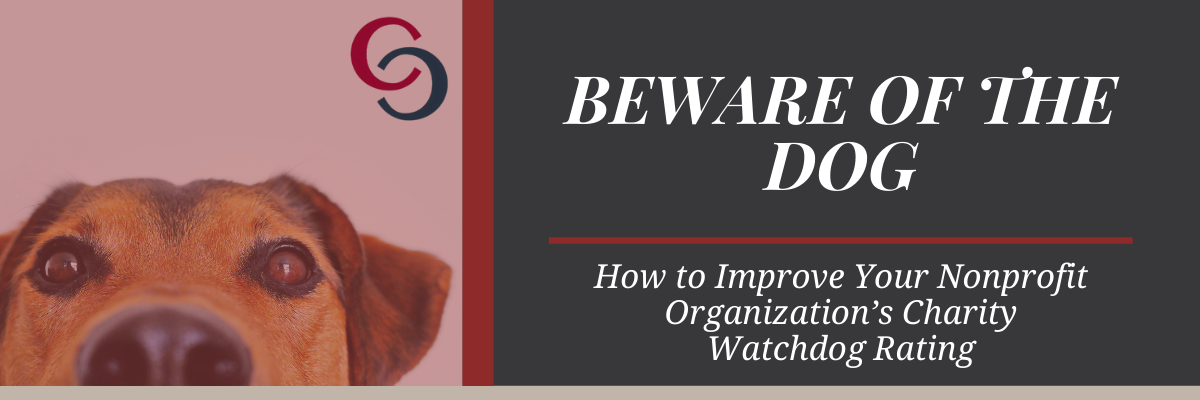
For better or for worse, charity watchdogs (CWDs) play a substantial role in any nonprofit’s reputation. CWDs rate 501(3)(c) public charities based on certain criteria, and both individuals and companies often use those ratings to decide whether to donate to a specific nonprofit organization. Positive ratings often provide a sense of credibility and trustworthiness to potential donors searching for an organization to donate to. Poor ratings can conversely signal to donors and members that they should tread lightly around a nonprofit because their track record is one of unreliable financial health or lacking transparency. If your nonprofit has been negatively affected by CWD ratings or not rated at all, fear not. This blog will review several ways to improve your nonprofit’s rating so your organization can successfully secure grants and donations.
1. Evaluate: How is your nonprofit organization rated?
Most CWDs focus on two key parameters in their ratings: Financial Health and Accountability and Transparency.
Financial Health:
As we mentioned in Part I of our Beware of the Dog series, an organization’s financial health rating is generally based on the information provided in the organization’s Form 990, an important IRS tax form that most nonprofits must complete annually. CWDs are particularly adept at parsing through these forms and decoding an organization’s financial efficiency. The most highly performing nonprofit organizations demonstrate not only financial efficiency, but also the ability to demonstrate that their financial choices are closely tethered to the organization’s goals. In other words, strong nonprofits are smart with their money and take great care to ensure they are effectively using funds to further their mission.
Accountability and Transparency:
The next parameter many CWDs use to assess nonprofits is “accountability and transparency.” Through a careful assessment of a nonprofit organization’s tax filings and information made public (i.e., information that can be readily found on the nonprofit’s website), CWDs determine whether they believe the nonprofit organization is ethical, truthful, and operating as expected. CWDs break this parameter down into other more detailed metrics to produce a thorough review. Metrics can include how well the organization documents board meetings to the accessibility of the organization’s Form 990 and other financial records. Meeting and surpassing these metrics make all the difference in the eyes of CWDs.
Why does this information matter? If you understand what CWDs are looking for (including the documents and information they rely on to assign ratings), you can make conscious changes about the way your organization operates. Over time, small changes will not only improve charity ratings but also provide another level of trustworthiness to stakeholders and board members.
2. Understand: Different CWDs have different rating systems (and processes!)
While there are a few big players in the universe of CWDs (Charity Navigator, Charity Watch, GiveWell, or GreatNonprofits), each CWD has its own unique approach to rating nonprofits. Some prefer to rate any nonprofit that meets the CWD’s internal criteria (usually related to size, income, or the specific type of organization.) Others look far and wide until they find the most exemplary nonprofits and showcase those organizations only. Of course, even highly established CWDs such as Charity Navigator are continuously revamping their rating system. Some CWDs compare nonprofit organizations to other similar nonprofits, usually those with similar missions. Understanding this process can help you understand what other highly rated nonprofit organizations are doing well so you can replicate those processes in your own organization.
3. Improve: Five ways you can increase your rating
- Implement the following policies:
- Conflict of Interest Policy
- Whistleblower Policy
- Records retention Policy
- Investment Policy
- Provide easy access to the following information on your organization’s website:
- List of board members and key staff
- Form 990 and financial statements (audited statements if available)
- Privacy policy outlining how a donor’s information is used
- List the process for determining CEO compensation.
- Ensure proper allocation of expenses on the Statement of Functional Expenses.
- Establish a financial audit oversight committee.
- Pay close attention to Program Service Accomplishments (Part III of Form 990) by providing quantitative data that shows the impact of the organization.
4. Remember: You can ask for help.
With so much riding on the accuracy and veracity of an organization’s finances, many nonprofits find great peace of mind consulting with an expert. Because certain CWDs allow nonprofits to appeal their rating and even have it removed if the organization can show it has resolved some of the identified problems, getting assistance from an expert can help a nonprofit start the process of improving its ratings more quickly. Even in the rare occasion where an appeal is not possible and it appears that the CWDs rating will stand, working with an experienced nonprofit accountant to correct inaccurate information and ensure that the organization is operating in a transparent manner will improve a nonprofit’s credibility.
Need assistance reviewing your financial information? We are just a click away!
Share This Post:

Chazin
With over 20 years working exclusively with nonprofits, we pride ourselves in having a unique understanding of nonprofit accounting needs. We believe that nonprofits deserve personalized, quality service and should not settle for a one-size-fits-all approach. We collaborate with you to provide a fully virtual and customized solution that is not only cost-effective but also strengthens your accounting function. We offer a team of industry experts at your disposal to provide advice, leading technology, and to supplement existing staff to improve efficiency and compliance.
